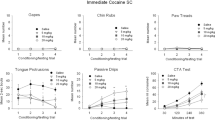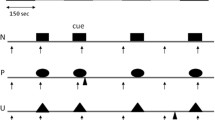Abstract
Rationale
Peripheral immune responses can be modified by associative learning procedures. Less is known, however, whether and to what extent neuroendocrine parameters can be classically conditioned.
Objectives
In this randomized double-blind study, we modified an established paradigm to behaviorally condition endocrine responses in humans.
Methods
Thirty-one healthy male participants received a distinctively flavored green drink as the conditioned stimulus (CS) and intravenous injections of corticotropin-releasing hormone (CRH) (CRH group, N = 17) or NaCl (placebo group, N = 14) as the unconditioned stimulus (US) during two subsequent acquisition trials. Plasma levels of cortisol and noradrenaline, heart rate, and psychological parameters were analyzed before and 15, 30, 60, 120, and 180 min after injection. The two acquisition trials were followed by two evocation trials, during which participants underwent the same procedure but now receiving NaCl injections.
Results
CRH administration induced pronounced increases in cortisol and noradrenaline plasma concentrations, heart rate, and anxiety levels. However, re-exposure to the CS during evocations trials did not provoke conditioned increases in neuroendocrine parameters. Median split of the CRH group based on the cortisol baseline level into “cort-high” and “cort-low” subgroups showed that the “cort-high” subgroup displayed a significantly increased cortisol production on evocation days compared to the “cort-low” subgroup and the placebo group.
Conclusion
This taste-endocrine paradigm employing CRH injection as the US in healthy male volunteers failed to induce a behaviorally conditioned cortisol release as a learned endocrine response. Future studies should clarify a possible role of higher baseline cortisol levels in perhaps facilitating a conditioned cortisol response.




Similar content being viewed by others
References
Abelson JL, Khan S, Liberzon I, Erickson TM, Young EA (2008) Effects of perceived control and cognitive coping on endocrine stress responses to pharmacological activation. Biol Psychiatry 64:701–707. doi:10.1016/j.biopsych.2008.05.007
Abelson JL, Khan S, Young EA, Liberzon I (2010) Cognitive modulation of endocrine responses to CRH stimulation in healthy subjects. Psychoneuroendocrinology 35:451–459. doi:10.1016/j.psyneuen.2009.08.007
Ader R (1976) Conditioned adrenocortical steroid elevations in the rat. J Comp Physiol Psychol 90:1156–1163
Ader R (2003) Conditioned immunomodulation: research needs and directions. Brain Behav Immun 17(Suppl 1):S51–S57
Albring A, Wendt L, Benson S, Nissen S, Yavuz Z, Engler H, Witzke O, Schedlowski M (2014) Preserving learned immunosuppressive placebo response: perspectives for clinical application. Clin Pharmacol Ther 96:247–255. doi:10.1038/clpt.2014.75
Albring A, Wendt L, Benson S, Witzke O, Kribben A, Engler H, Schedlowski M (2012) Placebo effects on the immune response in humans: the role of learning and expectation. PLoS One 7:e49477. doi:10.1371/journal.pone.0049477
Andreano JM, Cahill L (2006) Glucocorticoid release and memory consolidation in men and women. Psychol Sci 17:466–470. doi:10.1111/j.1467-9280.2006.01729.x
Banks WA, Kastin AJ (1985) Peptides and the blood-brain barrier: lipophilicity as a predictor of permeability. Brain Res Bull 15:287–292. doi:10.1016/0361-9230(85)90153-4
Benedetti F, Pollo A, Lopiano L, Lanotte M, Vighetti S, Rainero I (2003) Conscious expectation and unconscious conditioning in analgesic, motor, and hormonal placebo/nocebo responses. J Neurosci 23:4315–4323
Beylin AV, Shors TJ (2003) Glucocorticoids are necessary for enhancing the acquisition of associative memories after acute stressful experience. Horm Behav 43:124–131. doi:10.1016/S0889-1591(02)00067-3
Buchanan TW, Lovallo WR (2001) Enhanced memory for emotional material following stress-level cortisol treatment in humans. Psychoneuroendocrinology 26:307–317. doi:10.1016/S0306-4530(00)00058-5
Buske-Kirschbaum A, Grota L, Kirschbaum C, Bienen T, Moynihan J, Ader R, Blair ML, Hellhammer DH, Felten DL (1996) Conditioned increase in peripheral blood mononuclear cell (PBMC) number and corticosterone secretion in the rat. Pharmacol Biochem Behav 55:27–32
Enck P, Bingel U, Schedlowski M, Rief W (2013) The placebo response in medicine: minimize, maximize or personalize? Nat Rev Drug Discov 12:191–204
Fehm-Wolfsdorf G, Gnadler M, Kern W, Klosterhalfen W, Kerner W (1993) Classically conditioned changes of blood glucose level in humans. Physiol Behav 54:155–160
Goebel MU, Meykadeh N, Kou W, Schedlowski M, Hengge UR (2008) Behavioral conditioning of antihistamine effects in patients with allergic rhinitis. Psychother Psychosom 77:227–234
Grigoleit JS, Kullmann JS, Winkelhaus A, Engler H, Wegner A, Hammes F, Oberbeck R, Schedlowski M (2012) Single-trial conditioning in a human taste-endotoxin paradigm induces conditioned odor aversion but not cytokine responses. Brain Behav Immun 26:234–238. doi:10.1016/j.bbi.2011.09.001
Hadamitzky M, Bösche K, Wirth T, Buck B, Beetz O, Christians U, Schniedewind B, Lückemann L, Güntürkün O, Engler H, Schedlowski M (2016) Memory-updating abrogates extinction of learned immunosuppression. Brain Behav Immun 52:40–48. doi:10.1016/j.bbi.2015.09.009
Hui GK, Figueroa IR, Poytress BS, Roozendaal B, McGaugh JL, Weinberger NM (2004) Memory enhancement of classical fear conditioning by post-training injections of corticosterone in rats. Neurobiol Learn Mem 81:67–74. doi:10.1016/j.nlm.2003.09.002
Janz LJ, Green-Johnson J, Murray L, Vriend CY, Nance DM, Greenberg AH, Dyck DG (1996) Pavlovian conditioning of LPS-induced responses: effects on corticosterone, splenic NE, and IL-2 production. Physiol Behav 59:1103–1109. doi:10.1016/0031-9384(95)02171-X
Klosterhalfen S, Ruttgers A, Krumrey E, Otto B, Stockhorst U, Riepl RL, Probst T, Enck P (2000) Pavlovian conditioning of taste aversion using a motion sickness paradigm. Psychosom Med 62:671–677
Kreutz M, Hellhammer D, Murison R, Vetter H, Krause U, Lehnert H (1992) Pavlovian conditioning of corticotropin-releasing factor-induced increase of blood pressure and corticosterone secretion in the rat. Acta Physiol Scand 145:59–63. doi:10.1111/j.1748-1716.1992.tb09336.x
Laux L, Glanzmann P, Schaffner P, Spielberger C (1981) State Trait Angstinventar (STAI). Beltz, Germany, Weinheim
Lubow RE, Gewirtz JC (1995) Latent inhibition in humans: data, theory, and implications for schizophrenia. Psychol Bull 117:87. doi:10.1037/0033-2909.117.1.87
Martins JM, Kastin AJ, Banks WA (1996) Unidirectional specific and modulated brain to blood transport of corticotropin-releasing hormone. Neuroendocrinology 63:338–348
Nakahara M, Shibasaki T, Shizume K, Kiyosawa Y, Odagiri E, Suda T, Yamaguchi H, Tsushima T, Demura H, Maeda T, Wakabayashi I, Ling N (1983) Corticotropin-releasing factor test in normal subjects and patients with hypothalamic-pituitary-adrenal disorders. The Journal of Clinical Endocrinology & Metabolism 57:963–968. doi:10.1210/jcem-57-5-963
Nette AF, Abraham G, Ungemach FR, Oertel R, Kirch W, Leineweber K, Mohr F-W, Dhein S (2005) Interaction between simvastatin and metoprolol with respect to cardiac β-adrenoceptor density, catecholamine levels and perioperative catecholamine requirements in cardiac surgery patients. Naunyn Schmiedeberg's Arch Pharmacol 372:115–124. doi:10.1007/s00210-005-0005-6
Niemi M-B, Härting M, Kou W, del Rey A, Besedovsky HO, Schedlowski M, Pacheco-López G (2007) Taste-immunosuppression engram: reinforcement and extinction. J Neuroimmunol 188:74–79. doi:10.1016/j.jneuroim.2007.05.016
Ober K, Benson S, Vogelsang M, Bylica A, Gunther D, Witzke O, Kribben A, Engler H, Schedlowski M (2012) Plasma noradrenaline and state anxiety levels predict placebo response in learned immunosuppression. Clin Pharmacol Ther 91:220–226. doi:10.1038/clpt.2011.214
Orth DN (1992) Corticotropin-releasing hormone in humans. Endocr Rev 13:164–191. doi:10.1210/edrv-13-2-164
Pacheco-López G, Doenlen R, Krügel U, Arnold M, Wirth T, Riether C, Engler A, Niemi M-B, Christians U, Engler H, Schedlowski M (2013) Neurobehavioural activation during peripheral immunosuppression. Int J Neuropsychopharmacol 16:137–149. doi:10.1017/s1461145711001799
Pacheco-Lopez G, Niemi MB, Kou W, Harting M, Del Rey A, Besedovsky HO, Schedlowski M (2004) Behavioural endocrine immune-conditioned response is induced by taste and superantigen pairing. Neuroscience 129:555–562. doi:10.1016/j.neuroscience.2004.08.033
Pruessner JC, Kirschbaum C, Meinlschmid G, Hellhammer DH (2003) Two formulas for computation of the area under the curve represent measures of total hormone concentration versus time-dependent change. Psychoneuroendocrinology 28:916–931. doi:10.1016/S0306-4530(02)00108-7
Riether C, Doenlen R, Pacheco-Lopez G, Niemi MB, Engler A, Engler H, Schedlowski M (2008) Behavioural conditioning of immune functions: how the central nervous system controls peripheral immune responses by evoking associative learning processes. Rev Neurosci 19:1–17. doi:10.1515/REVNEURO.2008.19.1.1
Sabbioni ME, Bovbjerg DH, Mathew S, Sikes C, Lasley B, Stokes PE (1997) Classically conditioned changes in plasma cortisol levels induced by dexamethasone in healthy men. FASEB J 11:1291–1296
Schedlowski M, Enck P, Rief W, Bingel U (2015) Neuro-bio-behavioral mechanisms of placebo and nocebo responses: implications for clinical trials and clinical practice. Pharmacol Rev 67:697–730. doi:10.1124/pr.114.009423
Schedlowski M, Pacheco-López G (2010) The learned immune response: Pavlov and beyond. Brain Behav Immun 24:176–185. doi:10.1016/j.bbi.2009.08.007
Schurmeyer TH, Avgerinos PC, Gold PW, Gallucci WT, Tomai TP, Cutler GB Jr, Loriaux DL, Chrousos GP (1984) Human corticotropin-releasing factor in man: pharmacokinetic properties and dose-response of plasma adrenocorticotropin and cortisol secretion. J Clin Endocrinol Metab 59:1103–1108. doi:10.1210/jcem-59-6-1103
Stockhorst U, de Fries D, Steingrueber HJ, Scherbaum WA (2011) Unconditioned and conditioned effects of intranasally administered insulin vs placebo in healthy men: a randomised controlled trial. Diabetologia 54:1502–1506. doi:10.1007/s00125-011-2111-y
Stockhorst U, Gritzmann E, Klopp K, Schottenfeld-Naor Y, Hubinger A, Berresheim HW, Steingruber HJ, Gries FA (1999) Classical conditioning of insulin effects in healthy humans. Psychosom Med 61:424–435
Stockhorst U, Mahl N, Krueger M, Huenig A, Schottenfeld-Naor Y, Huebinger A, Berresheim HW, Steingrueber HJ, Scherbaum WA (2004) Classical conditioning and conditionability of insulin and glucose effects in healthy humans. Physiol Behav 81:375–388. doi:10.1016/j.physbeh.2003.12.019
Wasserman EA, Miller RR (1997) What's elementary about associative learning? Annu Rev Psychol 48:573–607. doi:10.1146/annurev.psych.48.1.573
Wendt L, Albring A, Schedlowski M (2014) Learned placebo responses in neuroendocrine and immune functions. Handb Exp Pharmacol 225:159–181. doi:10.1007/978-3-662-44519-8_10
Wood GE, Beylin AV, Shors TJ (2001) The contribution of adrenal and reproductive hormones to the opposing effects of stress on trace conditioning males versus females. Behav Neurosci 115:175–187. doi:10.1037/0735-7044.115.1.175
Zorawski M, Blanding NQ, Kuhn CM, LaBar KS (2006) Effects of stress and sex on acquisition and consolidation of human fear conditioning. Learn Mem 13:441–450. doi:10.1101/lm.189106
Author information
Authors and Affiliations
Corresponding author
Ethics declarations
Conflict of interest
The authors declare no conflict of interests.
Electronic supplementary material
ESM 1
(PDF 346 kb)
Rights and permissions
About this article
Cite this article
Petrakova, L., Boy, K., Kügler, M. et al. Plasma cortisol response cannot be classically conditioned in a taste-endocrine paradigm in humans. Psychopharmacology 234, 3249–3257 (2017). https://doi.org/10.1007/s00213-017-4718-2
Received:
Accepted:
Published:
Issue Date:
DOI: https://doi.org/10.1007/s00213-017-4718-2




